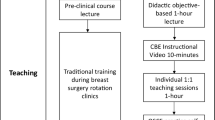Abstract
This study evaluated the effects of a refresher instructional audiotape on breast self-examination (BSE) proficiency 6 months after BSE had been trained to criteria. Subjects (n=54), who were undergraduate women, were trained in group sessions to perform BSE competently. Subjects were randomly assigned to one of two “maintenance” groups: tape or no tape. Tape-group subjects received a BSE tape at the end of their training session. Subjects in both groups received monthly mailed prompts. At 6 months posttraining, subjects were videotaped in a clinic environment while performing BSE and 10 components of the exam subsequently were evaluated. The results indicated that tape-group subjects showed significantly better performance than controls on four components, including amount of breast area examined. The tape had no effect on BSE frequency. The tape strategy may be valuable in maintaining proficiency once BSE is trained.
Similar content being viewed by others
References
American Cancer Society (1991).Cancer Facts and Figures—1991, American Cancer Society, Atlanta, GA.
Assaf, A. R., Cummings, K. M., Graham, S., Mettlin, C., and Marshall, J. R. (1985). Comparison of three methods of teaching women how to perform breast self-examination.Health Educ Q. 12: 259–272.
Atkins, E., Solomon, L. J., Worden, J. K., and Foster, R. F. (1991). Relative effectiveness of methods of breast self-examination.J. Behav. Med. 14: 357–367.
Coleman, E. A., and Pennypacker, H. S. (1991). Measuring breast self-examination proficiency.Cancer Nurs. 14: 211–217.
Fletcher, S. W., O'Malley, M. S., Earp, J. L., Morgan, T. M., Lin, S., and Degnan, D. (1990). How best to teach women breast self-examination.Ann. Intern. Med. 112: 772–779.
Janz, N. K., Becker, M. H., Anderson, L. A., and Marcoux, B. C. (1990). Interventions to enhance breast self-examination practice: A review.Public Health Rev. 17: 89–163.
Mayer, J. A., and Solomon, L. J. (1992). Breast self-examination skill and frequency: A review.Ann. Behav. Med. 14: 189–196.
Mayer, J. A., Beach, D. L., Kellogg, M., and Hillman, E. (1990). Breast self-examination proficiency: Pilot examination of an instructional audiotape.J. Educ. Technol. Syst. 18: 305–312.
Pennypacker, H. A., Bloom, H. S., Criswell, E. L., Neelakantan, P., Goldstein, M. K., and Stein, G. H. (1982). Toward an effective technology of instruction in breast self-examination.Int. J. Ment. Health 11: 98–116.
Saunders, K. J., Pilgrim, C. A., and Pennypacker, H. S. (1986). Increased proficiency of search in breast self-examination.Cancer 58: 2531–2537.
Author information
Authors and Affiliations
Additional information
This research was supported by a Dean's Research Award, College of Health and Human Services, San Diego State University (SDSU), to Dr. Mayer.
Rights and permissions
About this article
Cite this article
Jones, J.A., Eckhardt, L.E., Mayer, J.A. et al. The effects of an instructional audiotape on breast self-examination proficiency. J Behav Med 16, 225–235 (1993). https://doi.org/10.1007/BF00844895
Accepted:
Issue Date:
DOI: https://doi.org/10.1007/BF00844895




